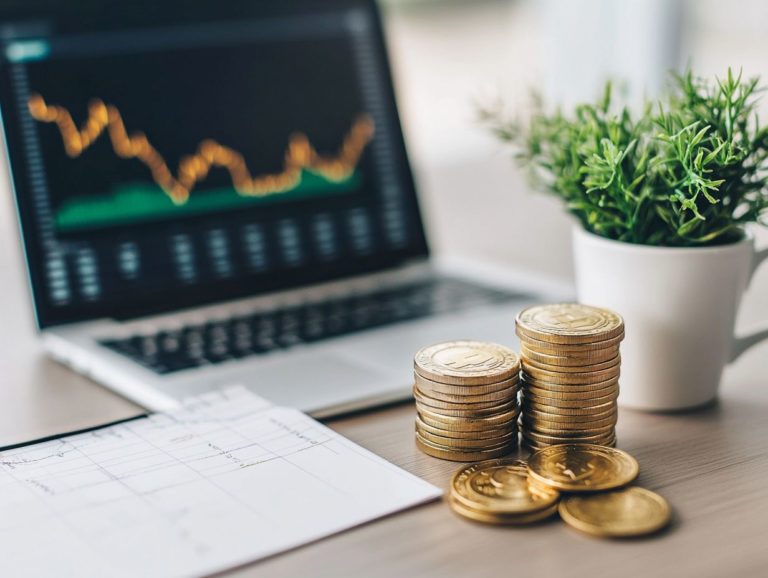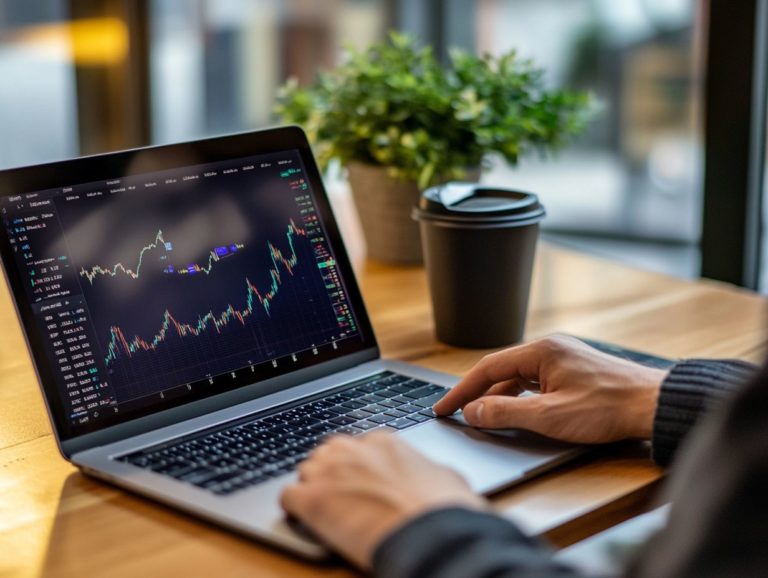How Global Events Influence Investment Strategies
Today, global events can greatly influence your investment strategies.
From geopolitical tensions and economic shifts to natural disasters, these occurrences can dramatically affect various asset classes, including stocks, bonds, real estate, and commodities.
Understanding how these events shape the investment landscape is essential for you as an investor looking to protect your portfolio and seize new opportunities.
This article explores the types of global events that can impact investments, the specific effects on different asset types, and effective strategies for adapting to these changes.
Jump in now to learn how to navigate the complexities of investing in a rapidly evolving environment.
Contents
- Key Takeaways:
- Defining Global Events and Their Impact on Investments
- Types of Global Events that Affect Investment Strategies
- How Global Events Affect Different Types of Investments
- Adapting Investment Strategies to Global Events
- Frequently Asked Questions
- 1. How do global events affect investment strategies?
- 2. Which global events have the most significant influence on investment strategies?
- 3. How can investors mitigate the risks associated with global events?
- 4. Are there any investment strategies that can leverage global events?
- 5. How do short-term global events differ from long-term ones in terms of investment strategies?
- 6. Can global events have a positive influence on investment strategies?
Key Takeaways:

- Global events can significantly impact investment strategies, including geopolitical events, economic changes, and natural disasters.
- Different investments, such as stocks, bonds, real estate, and commodities, are affected differently by global events.
- Adapting investment strategies to global events may involve risk management techniques, diversification strategies, and opportunities for growth.
Defining Global Events and Their Impact on Investments
Global events such as geopolitical tensions, economic downturns, or natural disasters play a key role in shaping your financial decisions and investment strategies. They significantly influence market volatility and investor behavior, often triggering immediate reactions in financial markets.
As these events unfold, you might find yourself reassessing how you spread your investments across different assets and refining your diversification strategies to meet your long-term goals. Understanding these interconnected dynamics is crucial for making informed investment decisions, particularly in a world where international relations and economic indicators are increasingly complex and unpredictable.
Types of Global Events that Affect Investment Strategies
Global events including geopolitical risks, economic shifts, and natural disasters hold significant sway over investment strategies and market dynamics. Each type of event presents its own challenges and opportunities, impacting investor behavior and overall market performance.
By understanding these categories, you not only enhance your risk management capabilities but also improve your ability to create resilient investment strategies that can withstand market fluctuations.
Geopolitical Events
Geopolitical events, such as the ongoing tensions between Russia and Ukraine or the policies of world leaders like Donald Trump, can lead to significant market volatility and impact your investor confidence. These situations create geopolitical risks that you must navigate, prompting adjustments in your risk management strategies and asset allocations to mitigate potential losses.
The implications of these geopolitical incidents extend beyond immediate financial fluctuations; they shape the broader landscape of international relations. Consider the aftermath of events like September 11 and Pearl Harbor; these occurrences not only caused market turmoil but also transformed global alliances and military strategies. You had to reassess shifting ties and emerging markets during these challenging times, often leading to a reevaluation of your investment portfolio.
In today s interconnected world, where crises can trigger rapid reactions in foreign exchange and commodities, understanding the relationship between these events and your financial strategies is essential for managing exposure and securing long-term returns.
Economic Events
Economic events like shifts in interest rates, corporate earnings reports, and broader economic growth trends are important for guiding the direction of financial markets. Analyzing these economic indicators helps you make informed decisions and adjust your investment criteria, especially during economic downturns that can affect market returns.
By keeping a close eye on these economic signals, you can uncover crucial insights into potential risks and opportunities that may be lurking on the horizon. For example, if interest rates rise, it could be time to reconsider your asset allocations and steer clear of high-debt companies that might struggle with increased borrowing costs.
Robust corporate earnings often indicate healthier market segments, prompting you to explore equities (stocks) more deeply. Understanding these dynamics positions you to respond strategically to fluctuating market conditions, ensuring your investment strategies remain both responsive and resilient in the face of change.
Natural Disasters

Natural disasters present distinct challenges for you as an investor, often causing temporary shocks to financial markets. These events can disrupt supply chains, strain healthcare infrastructure, and require you to swiftly adjust your investment strategies to effectively manage risk.
Take hurricanes, for example. When they strike coastal regions, property damage skyrockets, and industries like tourism and agriculture suffer immediate setbacks. Such disruptions can create a ripple effect on stock prices, particularly for companies that depend heavily on regional operations.
Earthquakes have a similar impact, leading to infrastructure losses that can dampen investor sentiment and trigger more cautious trading behavior.
In the long run, while some sectors may bounce back, others might struggle. This prompts you to reassess your portfolio and explore emerging opportunities in recovery and reconstruction efforts. This interplay underscores the importance of maintaining agile financial strategies to navigate the unpredictable landscape.
How Global Events Affect Different Types of Investments
Global events carry distinct implications for your investments, impacting everything from stock performance and bond yields to real estate values and commodity prices. The interconnectedness of financial markets means that shifts in one sector can send ripples through the entire investment landscape.
This dynamic environment encourages you to reassess your market analyses and asset allocations, ensuring that your strategies remain aligned with evolving conditions.
Stocks and Bonds
The stock market and bonds are often highly sensitive to global events. Fluctuations in market volatility can significantly influence your investment strategies. Key factors such as corporate earnings reports and changes in trading policies frequently dictate how these investments perform.
Geopolitical tensions, like trade disputes or conflicts, can provoke swift reactions from traders. You might find yourself looking to either capitalize on potential downturns or protect your assets from increased risk. For example, when a major international agreement is struck or unexpected economic sanctions are imposed, both stocks and bonds can experience drastic shifts in value.
This dynamic illustrates how investor psychology drives market movements. As you weigh the likelihood of future gains against potential losses, your portfolio allocations will inevitably adjust in response to the unfolding events around you.
Remember to regularly review your investment strategies based on global events, as staying informed is crucial for making effective decisions.
Real Estate
Real estate investments are often affected by economic growth trends and geopolitical risks, which can significantly alter market dynamics and property values. As an investor, it’s essential for you to assess these factors when making your investment decisions to truly optimize your returns.
Understanding the connections between global events and local markets is vital for anyone in the real estate sector. For example, when major economies face downturns, you might notice a dip in investor confidence. This can lead to decreased demand for properties.
Similarly, political conflicts between countries can reshape foreign investment patterns because safety and stability matter most. Fluctuations in currency values can affect how affordable real estate is, further influencing the overall strength of the market.
This is why savvy investors continuously monitor these shifting conditions, enabling them to navigate potential risks while seizing opportunities that can elevate their portfolios.
Commodities
Commodities, particularly precious metals like gold, often encounter price volatility influenced by market fluctuations stemming from global events, such as supply chain disruptions or currency shifts. By grasping these dynamics, you can make well-informed decisions about your commodity investments.
For instance, during political conflicts or natural disasters, demand for safe-haven assets like gold usually spikes, often resulting in sharp price increases. On the flip side, during periods of economic stability, a stronger currency may diminish demand for certain commodities, causing their prices to decline.
Recent events, including the pandemic and the subsequent recovery, have highlighted how global supply chain issues can create both opportunities and risks. Keep an eye on these patterns to seize opportunities, as timely reactions to fluctuations can lead to either substantial profits or significant losses in the fast-paced realm of commodity trading.
Adapting Investment Strategies to Global Events

Adapting your investment strategies in response to global events demands a sophisticated grasp of risk management techniques, diversification strategies, and the ability to pinpoint new opportunities for growth.
You must remain agile and responsive to shifting market conditions to optimize your portfolio and realize your long-term financial aspirations.
Risk Management Techniques
Effective risk management techniques are crucial for you to navigate market uncertainties and make well-informed investment decisions, especially during unpredictable moments triggered by global events. These strategies help protect your investments from potential losses.
By implementing a diversified investment strategy, you can spread your risk across various asset classes, which helps reduce your vulnerability to any single economic downturn. Utilizing hedging instruments tools to protect your investments like options and futures allows you to create protective positions against unexpected market shifts.
Incorporating geopolitical risk assessments into your decision-making processes can greatly enhance the resilience of your portfolio. Staying informed and agile is crucial; regularly reviewing and adjusting your allocations in response to emerging economic trends will bolster your ability to adapt.
These strategies not only safeguard your investments but also promote long-term financial stability, setting you up for success in the ever-changing market landscape.
Diversification Strategies
Implementing a robust diversification strategy is essential for managing your investment portfolio effectively, especially in the face of market volatility and shifting global events. This approach enables you to spread risk across various asset classes, enhancing the potential for positive investment outcomes.
By systematically allocating your resources among equities, bonds, real estate, and other alternatives, you can tailor your portfolio to better withstand the inevitable fluctuations of the financial landscape. These strategies extend beyond merely reducing exposure to a single type of investment; they also involve carefully selecting sectors and geographical regions. This provides an additional layer of protection against unforeseen downturns.
Effective asset allocation gives you the power to pursue your financial objectives with greater confidence, aligning your risk tolerance with potential returns as you navigate today’s economic environment.
Opportunities for Growth
Global events often reveal unique opportunities for growth in emerging markets and sectors driven by technological advancements. Identifying these opportunities can open up exciting new avenues for your investments and significantly influence your overall portfolio performance.
By closely monitoring geopolitical developments, such as trade agreements or climate initiatives, you can strategically position yourself in sectors poised to reap the most benefits. For instance, renewable energy and tech innovations are gaining momentum as governments prioritize sustainable solutions. Moreover, sectors like healthcare technology are set to expand due to rising demand for remote solutions in the wake of global health crises.
Adapting your investment strategies to include these high-potential sectors not only enhances diversification but also paves the way for significant returns in an ever-evolving landscape.
Frequently Asked Questions
1. How do global events affect investment strategies?

Global events can significantly impact investment strategies by affecting economic and political stability, currency exchange rates, and market trends. This can lead to changes in investor confidence and risk appetite, influencing investment decisions and portfolio allocations.
2. Which global events have the most significant influence on investment strategies?
The most prominent global events impacting investment strategies include political elections, trade agreements, natural disasters, and economic crises. These events can create uncertainty and volatility in the markets, leading to shifts in investment strategies.
3. How can investors mitigate the risks associated with global events?
Investors can mitigate the risks of global events by diversifying their portfolios across various asset classes and geographies. This strategy helps reduce the impact of any single event on their investments and provides a buffer against potential losses.
4. Are there any investment strategies that can leverage global events?
Yes, investment strategies that focus on leveraging global events are known as event-driven investing. These strategies involve identifying and capitalizing on market opportunities created by significant global occurrences.
5. How do short-term global events differ from long-term ones in terms of investment strategies?
Short-term global events, such as natural disasters or political elections, tend to have a more immediate and temporary impact on investment strategies. Conversely, long-term global events, like economic trends or demographic changes, can have lasting effects that require more thoughtful, long-term adjustments.
6. Can global events have a positive influence on investment strategies?
Indeed, global events can positively influence investment strategies. For example, a trade deal between two countries can lead to increased trade and economic growth, benefiting specific industries and companies, thus creating attractive investment opportunities. To understand how these factors play a role, consider the impact of economic trends on investment strategies. Similarly, a technological breakthrough or an increase in consumer spending can also positively impact investment strategies.
In summary, understanding and adapting to global events is crucial for successful investment strategies. Don’t miss out on the chance to evaluate your investment approach in light of current global developments!






